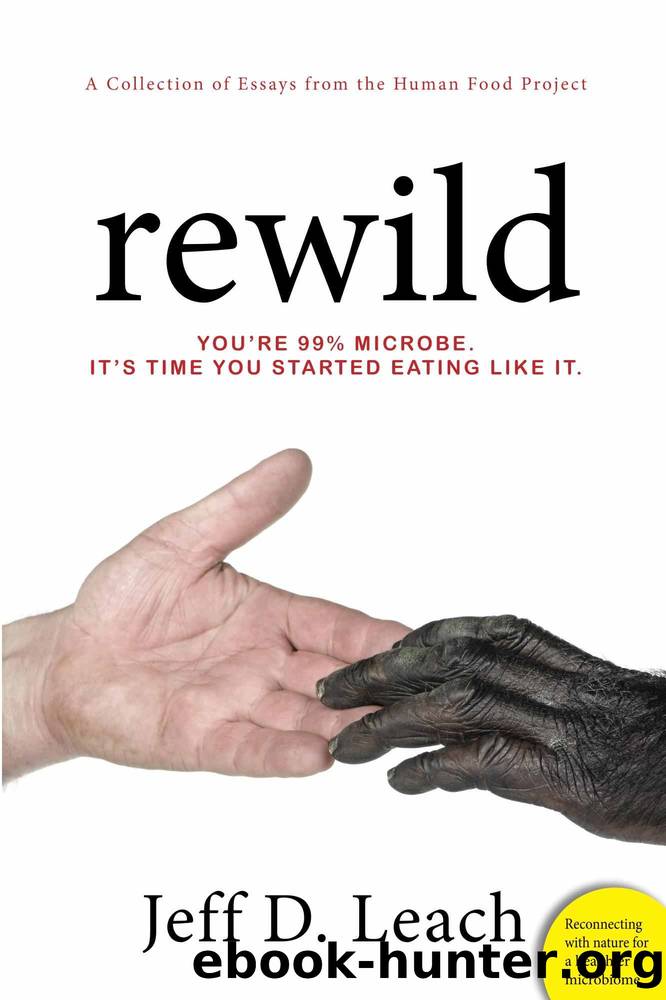Rewild by Jeff Leach

Author:Jeff Leach [Leach, Jeff]
Language: eng
Format: epub
Publisher: Human Food Project
Published: 2015-08-25T21:00:00+00:00
The impact of seasonality on the Hadza and their microbial environment is an interesting and possibly very important question as it relates to what a healthier microbiome might have looked like - before the comforts and medications of the current modern era whacked the crap out of our gut bugs. It’s not a stretch to say that nearly all of us in the western world are a hot microbial mess due to well, just about every aspect of our daily lives. Hence the emerging microbial connection to a staggering number of diseases and ailments in the twenty-first century including IBD, autoimmune diseases, obesity, type 2 diabetes and so on.
Should we really strive for a certain composition of gut microbes, as many modern buggy-like products infer, such as those found in over the counter probiotics as well as various other health drinks and foods? Or does the reality of our seasonal past reveal that our gut microbiome is a shape shifting metabolic organ pulling the strings of our health and well being in a bi-annual (or even tri-annual) circadian-like rhythm? Said differently, (and with all due respect to the brilliant Harvard researcher Richard Wrangham of fire made us human fame), is seasonality and its impact on our symbiotic microbes more responsible for what makes us human? I like to think it might be, plus ‘Seasonal Homo’ is kind of catchy.
The Hadza are particularly (microbially) interesting over say, other remote groups in South America as they still live in a part of Africa that purportedly gave rise to our genus - Homo. However, Lee Berger and his colleagues51 working new fossil sites in South Africa are giving East Africa a run for its money for the prize for deciding ‘which part of Africa holds the honor to the geographical cradle of humanity’. Regardless, being only a stone’s throw from famous paleontological sites like Olduvai Gorge of Leakey fame, the Hadza literally hunt and gather many of the same animals and plants that humans and our ilk have subsisted on for millions of years - not too mention they are covered in the same dirt, drink the same water (save the occasional cow turd floating about), and practice the same central-based foraging that has brought people together in microbial-sharing camps/communities for the better part of the Pleistocene. It is this foraging lifestyle that has endowed the Hadza with an extraordinary diversity of bacteria and it’s the diversity they carry that is most fascinating when compared to our less diverse western gut.
Download
This site does not store any files on its server. We only index and link to content provided by other sites. Please contact the content providers to delete copyright contents if any and email us, we'll remove relevant links or contents immediately.
The Lonely City by Olivia Laing(4799)
Animal Frequency by Melissa Alvarez(4465)
All Creatures Great and Small by James Herriot(4311)
Walking by Henry David Thoreau(3954)
Exit West by Mohsin Hamid(3824)
Origin Story: A Big History of Everything by David Christian(3689)
COSMOS by Carl Sagan(3618)
How to Read Water: Clues and Patterns from Puddles to the Sea (Natural Navigation) by Tristan Gooley(3466)
Hedgerow by John Wright(3355)
How to Read Nature by Tristan Gooley(3335)
The Inner Life of Animals by Peter Wohlleben(3313)
How to Do Nothing by Jenny Odell(3295)
Project Animal Farm: An Accidental Journey into the Secret World of Farming and the Truth About Our Food by Sonia Faruqi(3218)
Origin Story by David Christian(3195)
Water by Ian Miller(3179)
A Forest Journey by John Perlin(3069)
The Plant Messiah by Carlos Magdalena(2927)
A Wilder Time by William E. Glassley(2859)
Forests: A Very Short Introduction by Jaboury Ghazoul(2836)
